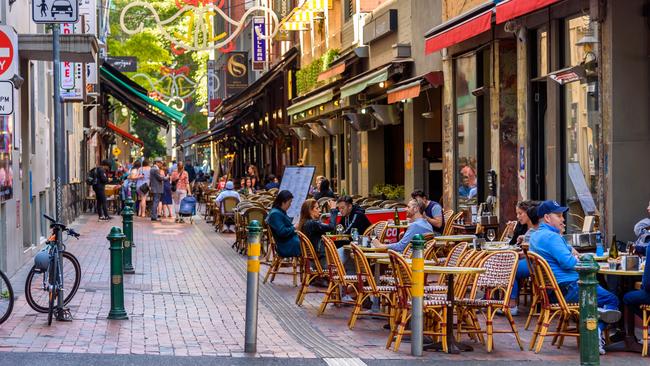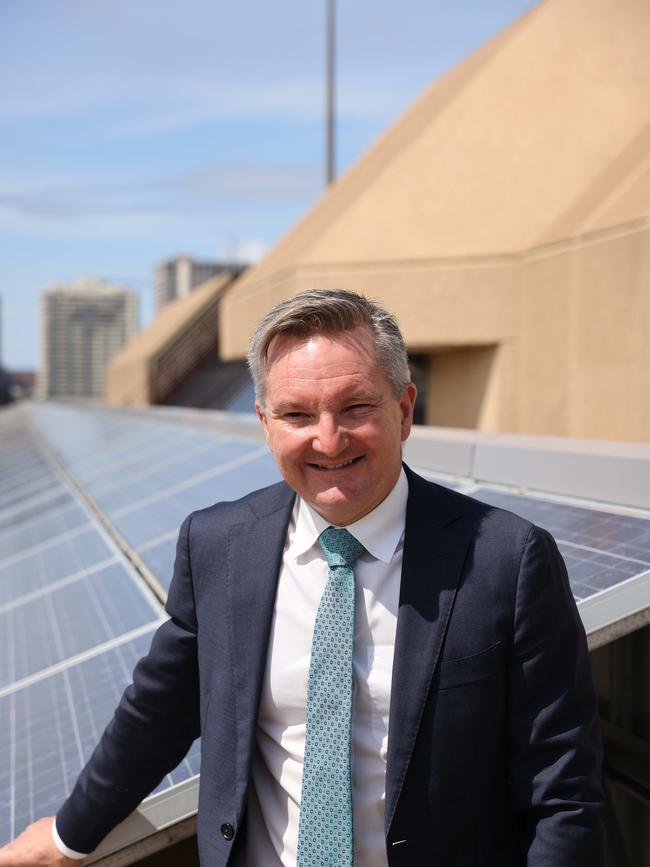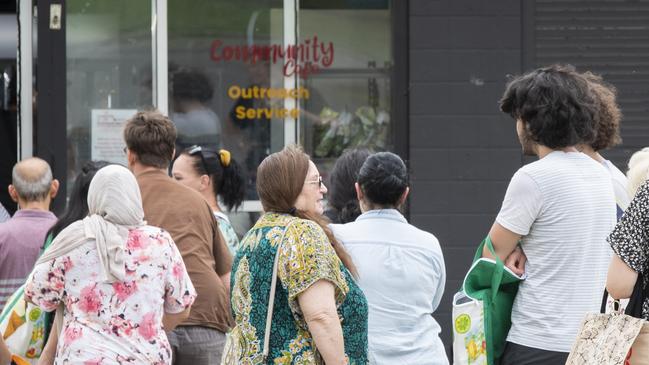We’re living through the bad times
The first task of government is to look after the people, but sober good sense seems to have fled the political stage, submerging us under a seeping mist of disorder.

How are things going in the public world of Australia? What is our current historical trajectory? Let me hazard an overview. We have, it seems, become submerged under a seeping mist of disorder, a miasma creeping in from the ocean, one hardly noticed over time.
One sign is the rising temperature of dissension. Fracturing multicultural cohesion is highlighted in mass demonstrations against Israel, demonstrations disapproved of by 90% of Australians. Shameless anti-Semitism has become ever-present and tolerated, with an upside-down logic accusing Jews of genocide when it is Hamas and Hezbollah, echoing Nazi doctrine, and with the covert support of most Palestinians, who want to destroy another race. ‘Lest we forget!’ is itself forgotten.
The time is skew. Things are not right. I’m mindful of the Jeremiah temptation—the prophet storming in from the desert to rant at the people to repent of their sins, or they’ll all be damned. The Australian bush poet equivalent is the resigned: “We’ll all be rooned,” said Hanrahan, in accents most forlorn. Ranting is unhinged, as is self-indulgent pessimism.
Further, on the surface, in any realistic comparative historical terms, things look pretty good. The nation is prosperous, the shops are full, unemployment is low, and there is no imminent threat of war. The long peace since 1945 of growth, wealth, progress, and relative social harmony continues unabated, interrupted by modest cycles.

Social order depends on smart and sensible politics. Weak leadership at the top risks sending discordant ripples down through the ranks of government and administration, resulting in poor vision and bad decisions that disrupt the smooth and efficient workings of an economy and the more generalised ways of life of the people. Fundamentals become overgrown with weeds.
Economic historian, Ian McLean in his 2013 overview Why Australia Prospered, concluded that the country’s economic success has been due to wise policy response and the quality of institutions in relation to the abundance of resources and fluctuating international economic conditions. Australia has usually been good at seizing opportunities offered internationally and been resilient to shocks, both positive (gold discovery) and negative (world wars and depressions). Political scientist A. F. Davies concluded, decades ago, that Australia had a talent for bureaucracy. I doubt either judgment holds today.
The first task of government is to look after the people, which means securing their prosperity and wellbeing, future planning, and defending the country. Each of the three challenges has sunk into neglect as sober good sense seems to have fled the political stage.
Leadership is about making hard decisions. Anthony Albanese seems constitutionally evasive, incapable of making the tough call, his characteristic look blank with uncertainty. He is stranded indecisively between three powerful and clashing forces—big business and economic dynamism, the unions, and the Greens. Bill Kelty, with his frontline experience of strong leadership in the Hawke/Keating years, judged the government as ‘mired in mediocrity’.
Symptomatic was the contrast that came with the announced retirement of Bill Shorten. In the outpouring of praise, and from across the political spectrum, Shorten suddenly seemed like a statesman. Bungled leadership was forgotten. And indeed, in today’s political landscape, he has looked like one of the few competent, industrious ministers, and a rare rational Labor voice on the question of Israel and Gaza.

The Federal government steers an ailing economy. Growth is negligible, inflation is stubbornly high—this used to be called stagflation. It responds to low productivity with new industrial relations laws guaranteed to worsen the problem. It seems to be doing its best to dampen the animal spirits that Keynes characterised as key to a vigorous economy.
Inflation has pitched large sections of middle Australia into ongoing cost-of-living pain, for many crippling—mortgage stress, high insurance, jumped food and petrol prices, and steep energy bills. The country has a basic need for hundreds of thousands of new homes, yet recent surges in building costs, inflated trades pay, and state and council inertia deter developers.
Leadership could bring the price of energy down. But a blind ideology of reducing carbon emissions whatever it takes, has left an administration flailing around, incapable of planning for base-load electricity generation. Here is a neglected fundamental. The relevant minister, Chris Bowen, fulminates and blusters while he dithers in contradiction. As the government dreams of a country covered in wind farms and thousands of hectares of solar panels, feeding the cities through non-existent transmission lines, it may be realising that the reality of summer blackouts will not endear it to the electorate. So, instead of caring for the people, it throws an insulting crumb at households, in the form of a one-off $300 electricity credit.
The Victorian Labor Government has projected wilful impracticality in flashing neon lights. The leading example of policy folly is gas. Victorian households and businesses are particularly dependent on gas appliances and machines, having benefited from low-cost gas from Gippsland for decades. There remain vast untapped reserves under the ground there, ones that don’t need fracking, yet the government continues to ban exploration, and now even furtively admits it may have to import gas. It thereby has cursed households, suffering hardship, to paying double to triple the price they might be paying. It is forcing businesses such as Sorbent to shift overseas—due to its gas price tripling. One of the elementary laws of economics holds that if a place has a comparative advantage over other regions and countries, in this case cost of energy, it should exploit it. One can only shake one’s head in disbelief, that the Victorian government has proudly capsized the State’s precious competitive advantage.

Still in Victoria, mental disorder and domestic violence were aggravated, even precipitated by unnecessarily severe COVID lockdowns. It became known early on that children were at negligible risk from the pandemic, but schools and playgrounds were closed. It became known that open-air infection was unlikely, yet golf courses became off-limits. A ring of steel imprisoning Melbourne was the ultimate signal that the Premier held his own citizens in contempt. Admittedly, in the early days, the government did need to protect its fragile health system (another example of poor administration) from being swamped, as had happened in northern Italy and New York. But, as time passed, the Premier seemed to relish his draconian lockdown powers, implementing new ones at will. Still today, years later, the effects linger—in school truancy, teenage mental disturbance, family schism, and almost certainly, in the general mood.
Turning to defence, the first national threat since 1945 has produced grandstanding rhetoric, accompanied by a policy vacuum apart from the nebulous far-distant promise of AUKUS: little practical action, little increase in proportional GDP expenditure, lethargic planning by a risk-averse defence bureaucracy, and even more complete dependence on the United States. Here is the high-tide mark of a government taking its mandate about as seriously as the Queen of Hearts took croquet in Alice in Wonderland.
One characteristic of good government and worthy leadership lies in its moral compass, which should only need to show rarely. The Prime Minister has spoken repeatedly about our traditional ally Israel, which is fighting for its life, spoken with evasive mealy-mouthed embarrassment. When HAMAS shot six innocent hostages two months ago and paraded its own atrocity with brazen affrontery before the world’s eyes, Anthony Albanese looked away. It seems the Prime Minister had spent all his moral energy on his failed Voice campaign. One can only imagine in what regard many of our Jewish citizens hold him. Bob Hawke would turn in his grave.

I have been rehearsing particulars, which taken together reflect a general state. There is a mood that comes over a nation, hard to register with precision. Shakespeare, the supreme master at giving form to almost every conceivable human experience, evokes such a mood, subtly in the second part of Henry IV. The old king is mortally sick, and his kingdom is afflicted by civil war. Although his troops are prevailing, his dour temper is hardly lifted by good news. The heroic swashbuckling of the recent past is gone.
The dominant stage presence, Sir John Falstaff, has become gloomy, Falstaff the loveable, immensely fat drunken buffoon, thief, coward, but always with sharp tongue and quick wit ready to parry off the endless mockery to which he is subjected. This jolly braggart, who had always charmed with being resolutely cheerful, is now worried about his waters—his doctor tells him they are fine, but the housing body may be riddled with disease. Falstaff complains about gout. Vomit, pox, apoplexy colour the times, which are dull and heavy, sleepy and even sordid. There is no honour, promises are not kept, debts are not paid. Taverns have become brothels. The climax comes when the newly crowned Henry V rejects Falstaff, his old friend and companion mentor of his wayward youth, with the cold, heart-piercing cruelty of:
I know thee not, old man. Fall to thy prayers.
How ill white hairs becomes a fool and jester!
I have long dreamt of such a kind of man,
So surfeit-swelled, so old, and so profane,
But, being awakened, I do despise my dream.
Presume not that I am the thing I was
The mood colouring 2024 Australia shares similarities with Henry IV’s England, but the setting is different. Soft times can make people silly. Alexis de Tocqueville observed that political revolutions never emerge from among the oppressed and the poor, but rather from those on the rise, ones with increasing expectations that are thwarted. Robert Putnam, in his definitive study on social capital, Bowling Alone, observed that the peak of social capital—the degree to which people socialised, joined clubs and associations, and volunteered—occurred in the 1960s and 70s. The main factor was a generation who had experienced the Great Depression and war and had learnt through hardship the importance of community engagement.

Hard times force a reality principle. The day-to-day pressure of working to pay bills to feed, clothe, house, and educate a family, with all its attendant worries, is likely to focus the mind and wean it from remote fantastical causes. Likewise, big business finally seems to be ditching its virtue-signalling poses as it wakes up to the threat of a high taxing and regulating, old-style socialist government.
Emblematic of today’s bad political times is the emergence of the new-look Green party, shed of its part-practical environmentalism, reborn as megaphone for radical left dissent. 1960s student rancour is reborn, as if in a geyser of vitriol hatred of the society that has spawned its young members, educated them, fed and clothed them, their parents indulging them, giving them opportunities that virtually none of their ancestors enjoyed. Vandals who have never grown up shout tantrum obscenities, throw rocks and acid at police and their horses.
The rocks and acid may well come from a small rabble minority, but they reflect the ideological rage of a significant slice of generation Z. Green politicians defend attacks on police who are just doing their job—in effect attacks on social order and the authority necessary to maintain it. If they were true to their principles, they would resign from office.
The Greens are ideology addicts with no stomach for the facts of history or the reality of hard slog, day-to-day political management. They champion phony egalitarianism, narrowing roads for bike lanes to be used by 5% of the population, whilst handicapping the less well-off who live in outer suburbs and are car dependent, oblivious to the fact that Australia’s cities lack the density of Rome or Copenhagen. Greens likewise champion phony multiculturalism, idealising the oppressed of the current hour—far distant Palestinians—while condoning attacks on local Jewish citizens and businesses. They are anarchists in spirit, with a discontented lust for mayhem and riot camouflaged under the smoke of high ideals.

There is one genuine grievance the Greens may exploit. Generation Z, with those immediately preceding it, may be waking up to the fact they have been largely excluded from the Australian dream of owning their own home—traditionally seen as the foundation for happy family life and social stability. They have been truly disadvantaged. Only one in seven houses are now affordable for average-income households. The Green policy cap on rents may thus seem to address a need, although unintended consequences are likely to nullify the effect.
Bad times that have not resulted from external shock such as war, must somehow reflect education in the broad having gone wrong. Such serious impairment of collective wisdom is the fault of elders. But where are the elders; indeed, who are the elders today? Kafka told the parable of a kingdom in which children were given the choice of being kings or couriers for kings. They all chose to become couriers, so, in the absence of kings, life in the kingdom became one of people rushing around carrying meaningless messages.
In terms of the responsibility of elders, our children are the hope of the future, for it will be their task to renew the world they inherit. But little care has been taken of those tasked with nurturing them, the teachers. Mainly held in poor regard, our front-line educators are left to fend for themselves in classrooms where the old aura of authority that once supported them has thinned.
Universities are the source of where all went awry. In the lecture halls, wisdom resides, if anywhere, in a collective ethos shared by academics. In the old order, they saw their mission in the humanities as transmitting Western culture, as expressed through the finest literature, art, philosophy, and methods of thinking of the past. The privilege of being the repository imposed a noblesse oblige, of honouring the past, and introducing young minds to its ways, to give them the capacity to forge their own pathways.
Then a new disposition appeared, especially after the 1960s, overturning the old order, with love for the culture replaced by hate. The new watchwords became tear down, destroy, cancel. Those who came before were despised, not revered, as was the world they had built. Lecturers and professors were swept away in a fervour of resentment, blaming their own society and its ways for their suffering from what can only have been some deep personal disappointment. That disappointment may have been a spiritual crisis in which they had lost their old faith—whether in God; in truth, beauty, and right order; or ultimately in themselves. So, they sowed the whirlwind.
Current bad times might well attract the disdain of So surfeit-swelled, so old, and so profane. The metaphor is, I suggest, more apt than it may seem. However, the new king that is longed for will not appear in the guise of one brilliant individual, a Henry V. It will require much, much more, a sea change in the elite domains of the culture and its institutions.
John Carroll is professor emeritus of Sociology at La Trobe University.





To join the conversation, please log in. Don't have an account? Register
Join the conversation, you are commenting as Logout